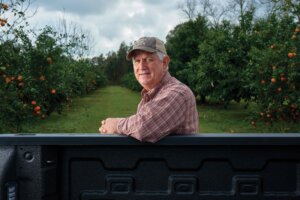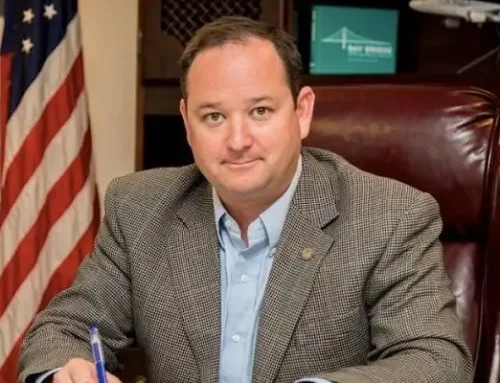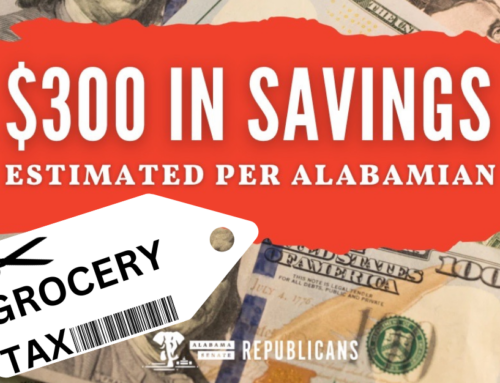Alabama agriculture interests are well represented in the Legislature even if full-time farmers are few and far between. Only one House member lists “farmer” as all or part of his occupation, but seven of the state’s 35 senators do.
“I think the numbers may be a little bit misleading, because a lot of the guys that do have agriculture interests also have other interests,” says Sen. David Sessions, who with his brother runs arguably the largest and most diversified farm among them.
“One of our farmers has a truck company. One of our farmers is an OB/GYN. Another farmer is an anesthesiologist. Another farmer that was in the poultry business, he’s a developer. Most of our agriculture folks have other jobs.”
Regardless of how much time they may spend actually working crops, fields, orchards, cattle or timber, they are often involved with family farms that go back at least a few generations.
Sessions’ father started the family farm with a Veterans Administration loan when he came home from serving in World War II. Today, Sessions Farm encompasses 2,800 acres in the Grand Bay area of Mobile County, running to the Mississippi state line.
Row crops are cotton and peanuts. On 150 acres of produce are watermelon, cantaloupe and tomatoes. There are 300 acres devoted to pecan trees, 30 acres of citrus and 200 beef cattle. A retail farmer’s market is also in the family.
The diversity protects against a bad year for one or more areas and fluctuating market prices, Sessions says. In 2022, for example, the produce did well in the spring, but summer’s rainy weather hurt the pecan crop and cotton. Cotton prices were up and down.
“I sold cotton as high as $1.33 [per pound] this year, but I sold some as cheap as 82 cents, too,” Sessions says. “The $1.33 is decent profit. The 82 is basically losing a dime.”
Rep. Mike Holmes, who lives outside Wetumpka, retired from the Legislature in 2022 in part because of age and in part because he believes in term limits. Now 80, Holmes was born in the front parlor of the family homestead and farm in Crenshaw County during WWII. More than 100 years old, the farm is officially designated an Alabama Centennial Farm.
While Holmes’ brother manages the farm devoted to pastureland and cattle, Mike Holmes went into corporate agri-business, starting out as a sales representative and retiring twice as CEO of corporations involved with agricultural genetics. He and his wife now manage timber assets in which they invested along the way.
“Farmers tend to be their own bosses,” Holmes says. “If they see things that they don’t like, the way the country’s going or the county’s going or the state’s going, they’re the first to raise their hands and say, ‘I think I can help fix this.’ And that’s when they run for office.”
Nationally, however, the number of farmers serving in state legislatures has dropped by nearly half over the last 30 years, according to Todd Makse, associate professor and director of undergraduate studies at Florida International University’s School of International and Public Affairs.
In Alabama, Makse’s research shows that the proportion of farmers in the Alabama Legislature dropped from 3% to 1.5% over the same period. Those numbers include ranchers and cattle farmers, but not people in “agriculture-adjacent” businesses who identify as businesspeople first, Makse told Business Alabama in an email.
“It could be that fewer farmers are running for office, fewer farmers are winning when they do run, or that persons with a farming background and other professional pursuits are more likely to self-identify with the other category,” he says.
AGRICULTURE ISSUES
Agriculture issues are almost certain to be on the 2023 legislative agenda. Here are some of the key topics.
Feral swine
Sessions doesn’t mince words about how he would like to resolve the problem of wild hogs destroying crops. “I think we need to classify them as an invasive species and a nuisance. That’s a step in the right direction. They need to be taken out by any means necessary.”
Feral swine are prolific and particularly partial to pecans and peanuts, Sessions says. They have no natural predators. “They’re not as bad up north as they are along the coasts of Texas, Louisiana, Mississippi, Alabama and Florida.”
He estimates they cost his farm thousands of dollars every year, despite fencing off crops as well as trapping and shooting the hogs. And during deer season, feral swine cannot be hunted at night.
Sessions thinks Alabama should work with other coastal states, especially Texas, which is developing technology in hopes of poisoning or sterilizing them. One possibility is feeders with sensors that would identify wild hogs by shape and block access to creatures like deer and bears. Such a plan would require educating hunters about recognizing and not butchering a hog that may have been poisoned.
“The only way you’re ever going to control them is to eradicate them,” he says.
Newly elected Sen. Josh Carnley says wild hogs also cause trouble on his family farm in Coffee and Escambia counties. Carnley lives on the farm in the Ino community in Coffee County.
“On our farm, we shoot hogs. We go out at night. We have a permit,” he says. Still, the hogs can’t be hunted at night during deer season.
Carnley, a former Coffee County commissioner, says neighboring farmers need to work together to prevent feral swine from migrating to a neighboring property if one farmer drives them away.
A partner in running his family farm, Carnley mainly handles the books and other finances. He started an insurance agency after college that focused on agriculture insurance but later added partners and other specialties. He remains focused on farm, agriculture and crop insurance.
The farm encompasses 900 acres of soybeans, 300 acres of corn and 200 acres of cotton. It also has 75 head of cattle.
Farmers on the highway
“One of the issues we’re facing down here is farm equipment on highways,” Carnley says. “I know down in Mobile and Baldwin counties it’s a bigger issue, but it is over here, too. Farmers are being viewed more as a nuisance now because you’re on the highway with this larger equipment.”
The conflict is between slow-moving farm equipment and increasing traffic from tourists and new residents. Farmers also are using larger pieces of equipment that can do more and cover more territory, partly in response to labor shortages, Carnley says.
“We’ve had issues up here with accidents. I think farmers are doing their best not to be on the highway at busy times because it’s just as much a headache for them,” Carnley says.
But while farmers try to stay off major highways, tourists are trying to find shortcuts to avoid heavy traffic and they wind up speeding down county roads. “We get a lot of beach traffic passing through headed to Panama City or Destin,” Carnley says.
In the past, farmers and motorists showed more respect for each other, he says. Now the issue has become one of public safety.
Business licenses and right-to-repair
“We’ve done a lot in recent years to alleviate economic hardship on farmers. Last session we had some things on business licensures,” says Sen. Andrew Jones.
Jones says he was able to pass a local bill exempting farms from needing business licenses, and subsequently the bill was duplicated statewide.
Jones’ family had a dairy farm in Cherokee County that was founded by his grandfather and later taken over by his mother. Jones still lives on the farm in Centre, but derives most of his own income from a coffee factory he started that roasts coffee to sell wholesale to supermarkets and to online customers. He notes, however, that good coffee beans won’t grow in the United States outside of Hawaii.
The family changed course in about 2011, transitioning to beef cattle.
“At one time there were several thousand dairies in the state of Alabama. When we got out of the dairy business and transitioned to a beef cattle operation, we were one of 26 left in the state.”
Small dairy farms simply couldn’t compete with large operations of 2,000 or 3,000 head that were more profitable because of economies of scale, Jones says. Today his parents operate a farmers’ market while he, his brother and his sister run about 200 head of “mama cows” on 570 acres. They also grow their own hay and have some timber. Most calves are sold.
Although it’s more a federal issue than a state one, Jones says he thinks farmers deserve to repair their equipment without being tied up by warranties or other regulations and restrictions such as the required use of licensed repair people.
“Going back a hundred years or better, farmers have always been able to repair their own equipment or get their neighbor to help them or whatever,” he says.
While Jones would like to look at state legislation on that topic, it might be difficult to draw up something that could conflict with other states or federal regulations.

Fuel costs, inflation and fertilizer
Alabama farmers are fighting higher costs for fertilizer and diesel fuel, the legislators say. Jones notes that some fertilizer ingredients come from Ukraine and the Russian invasion has driven up costs. Diesel fuel is often needed to run equipment, while general inflation has affected farmers, just like everyone else. Again, what can be done on the state level is unclear.
Overall, Sessions describes farming as having one thing in common with the Legislature and the game of football. “There’s always next season.”
Jane Nicholes and Dan Anderson are freelance contributors to Business Alabama. She is based in Daphne and he in Mobile.
This article appears in the January 2023 issue of Business Alabama.






